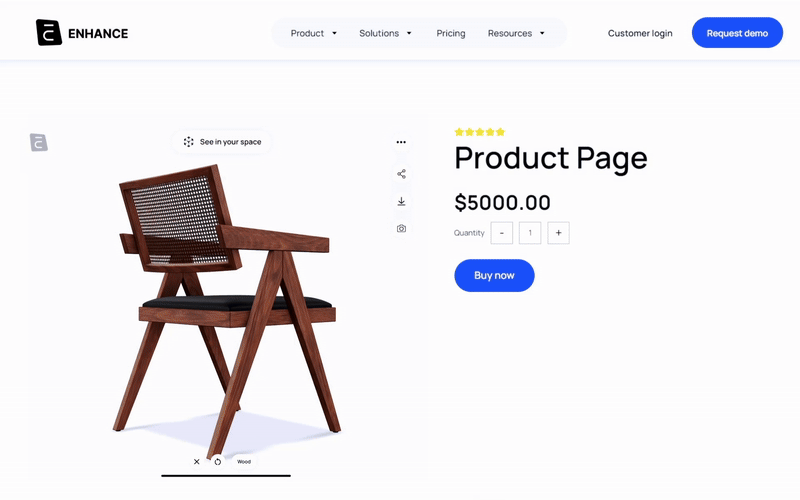What does it take to stay relevant in a rapidly shifting furniture market? For over six decades, Muebles Romero has answered that question with innovation, thoughtful design, and a deep understanding of its clients' needs. Known for its expansive and evolving catalog comprising more than 1,000 furniture pieces and accessories, the Valencia-based brand has earned its reputation through a product range that combines versatility, durability, and style. Specializing in furnishing hotels, offices, and retail and restaurant chains, the company has extensive experience right across the contract furniture sector, from stunning terrace arrangements through to high-design interiors.
A key strength lies in its dedicated and expansive infrastructure. Its 17,000-square-meter facility enables Muebles Romero to maintain high levels of stock availability and ensure swift fulfillment—a defining operational advantage supported by a seasoned workforce. These capabilities allow the company to expand their catalog year after year, creating greater choice for customers. Meanwhile, their expert technical team offers furniture customization to order, enabling the creation of exclusive designs at scale for bespoke projects. These factors combine to make Muebles Romero a trusted partner for high-demand hospitality projects where experience and agility are essential.
A family business built for the future
Behind Muebles Romero’s momentum is an evolution shaped by forward-thinking leadership. As a family-run company, the business recently underwent a comprehensive internal review, with each family member undertaking in-depth professional and personality assessments. The goal was to align roles more closely with individual strengths, improving governance in the process and creating an organizational structure better suited to driving the next phase of growth.
This transition reflects broader strategic ambitions. Alongside new product innovations and international expansion, the launch of the ROCO line marked a significant advancement in the company’s brand identity—introducing a curated range of models tailored to high-end, design-led spaces. This move also signals a bold vision for the future: one where operational efficiency, progressive leadership, and next-generation technology come together to shape a globally-minded and diversified business.
“Muebles Romero is a forward-thinking, family-run company with international ambition. They're evolving rapidly and putting technology at the heart of their business to stay competitive and better serve their customers.”
- Rafael Muñoz, Founder, Enhance XR
An innovation-first mindset in furniture
Muebles Romero’s ethos is rooted in practical innovation. In recent years, the company has developed and patented the Es.Table, an anti-tilt system which adapts to uneven ground. Adjusting to height differences of up to 15mm, it solves a daily operational challenge for hospitality venues. Similarly, the company’s wireless charging tables anticipate the expectations of today’s digital-first guests, offering a standalone charging solution that doesn’t require an electrical outlet and offers up to eight days of battery life. Meanwhile, the launch of the ROCO brand highlights Muebles Romero’s forward-thinking approach—blending style with functionality, and durability with design, aligning the business with the key trends currently shaping the furniture sector.
%2017.14.43.png)
Today, that ethos extends to boosting operational resilience through technology. As customer demand sharpens around personalization, speed, and sustainability, Muebles Romero is investing in advanced digital customer experiences. From real-time configuration to immersive visualization, the forthcoming introduction of digital tools powered by 3D and augmented reality (AR) marks a step change in how customers experience and purchase furniture.
Digital tools elevate product experiences
Investing in 3D and AR is a natural evolution for Muebles Romero, where technology serves a clear purpose: to enhance and extend what it already does well. As with its approach to innovations such as AI and intelligent materials, it’s not disruption for its own sake, but a strategy to deepen customer value through digital tools. For a company that ships over 250,000 products each year and offers more than 7,000,000 combinations of colors, finishes, and materials, integrating 3D configurators and immersive visualizations is an effective and engaging way to let customers explore and tailor products, then preview them in their intended spaces.

Enabling customers to experiment with different product options, variants, and finishes in real time—with just a click—these are tools that open up the full potential of the company’s offering and bring them to life for buyers. In this interview, Brand & Contract Manager Pablo Romero Cerdido shares insights into the company’s strategic direction, the role of AI, and how the business is aligning digital innovation with the evolving priorities of the hospitality furniture market.
Sustainability, technology, personalization: Turning furniture trends to competitive advantage
What has been the most significant shift in how furniture customers make purchasing decisions?
In the last two years, the most significant change in how furniture customers make purchasing decisions has been the prioritization of sustainability and personalization, along with an increase in the use of digital tools for evaluation and purchase.
What strategies do you consider essential for success in today’s furniture industry?
Success in the furniture trade today requires a combination of technological adaptability, a commitment to sustainability in materials, production processes, and certifications, and a customer-centric approach. Companies that integrate these strategies will be better positioned to compete and thrive in an ever-evolving market. Additionally, it's crucial to focus on the countries where commercial actions for export are developed, as European manufacturing is highly valued.
Which innovation excites you the most and why?
One of the most exciting innovations in the hospitality furniture sector is the advanced integration of smart design technologies and intelligent materials. This will not only revolutionize the product itself but also the customer experience. Both augmented and virtual reality, along with 3D configurators, are completely transforming customers' ability to visualize our furniture in their spaces, greatly facilitating project realization.

Which technologies have offered the highest return on investment (ROI) in your digital commerce operations so far?
The technologies with the highest ROI combine improvements in customer experience and operational efficiency, such as advanced e-commerce platforms, data-driven marketing, and automated service tools.
If you had to prioritize investment in one area, which would you choose and why?
If I had to prioritize an investment in the context of a hospitality furniture factory, I would choose AI-based predictive intelligence as the main focus area. This approach offers the greatest potential to impact all stages of the business, from production to customer experience.
Could you share an example of a company that has successfully implemented any of these strategies? What impact did it achieve?
Although its focus isn't on hospitality, IKEA is a clear example of how the combination of advanced technologies—AI, AR, 3D configurators—and customer-centered strategies can transform a business. They have significantly reduced their operational costs and experienced substantial growth in their digital sales.
Future-facing furniture strategy
Muebles Romero’s trajectory reflects a wider transformation in the hospitality market and furniture sector at large. As sustainability, vibrant digital experiences, and tailored buying journeys become the industry standard, manufacturers must evolve to stay competitive.
By strategically embedding immersive tools into its manufacturing and customer service model, Muebles Romero is strengthening its core proposition—reliability, design integrity, and operational agility—while positioning itself for long-term relevance in a changing landscape. In a sector where experience increasingly defines value, that integrated approach translates into significant competitive advantage.
Curious how digital tools like 3D and AR can support your furniture strategy? Contact Enhance XR to explore what’s possible.






%2016.18.08.png)
